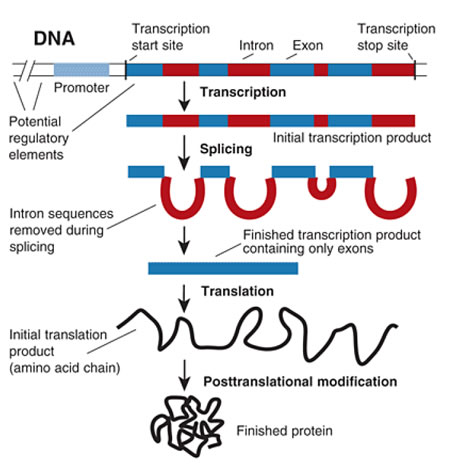What is Gene Expression?
Gene expression is the process by which information from a gene is used in the synthesis of a functional gene product. These products are often proteins, but in non-protein coding genes such as rRNA genes or tRNA genes, the product is a functionalRNA. The process of gene expression is used by all known life - eukaryotes (including multicellular organisms), prokaryotes (bacteria and archaea) and viruses - to generate the macromolecular machinery for life.

Gene structure and gene expression in higher organisms
Several steps in the gene expression process may be modulated, including the transcription, RNA splicing, translation, and post-translational modification of a protein. Gene regulation gives the cell control over structure and function, and is the basis for cellular differentiation, morphogenesis and the versatility and adaptability of any organism. Gene regulation may also serve as a substrate for evolutionary change, since control of the timing, location, and amount of gene expression can have a profound effect on the functions (actions) of the gene in a cell or in a multicellular organism.
In genetics gene expression is the most fundamental level at which genotype gives rise to the phenotype. The genetic code is "interpreted" by gene expression, and the properties of the expression products give rise to the organism's phenotype.
Further Reading
- Gene Expression Mechanism
- Gene Expression Measurement
- Regulation of Gene Expression
- Gene Expression System
- Gene Expression Techniques
This article is licensed under the Creative Commons Attribution-ShareAlike License. It uses material from the Wikipedia article on "Gene expression" All material adapted used from Wikipedia is available under the terms of the Creative Commons Attribution-ShareAlike License. Wikipedia® itself is a registered trademark of the Wikimedia Foundation, Inc.
Comments
Post a Comment
Nice article